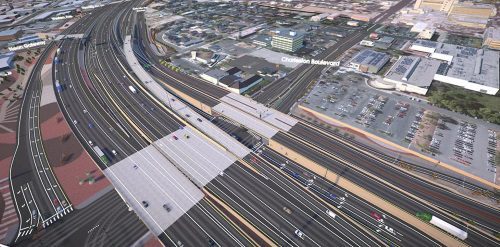Report Encourages Electrification of Nevada’s Transportation System

A 69-page report funded by the Governor’s Office of Energy suggests that Nevada should plan to “electrify” its transportation system in part through electricity generated from solar and geothermal sources.
[Above photo by the Nevada DOT.]
“Electrifying the movement of goods and people around the state moves the needle forward on all of Nevada’s priorities for growth and livability – energy independence, clean energy, clean air, economic mobility, and an efficient transportation system,” the report noted.
Authored by Lauren Rosenblatt and Marie Steele, principals of consulting firm e-centricity, LLP, the report stressed that “increased fuel efficiency in motor vehicles” is decreasing motor fuel tax revenues – the primary source of funds both in Nevada and nationally to maintain and develop the transportation system.

Yet they argued that “much of the cost of transportation electrification will fall within existing budgets to maintain a 21st-century transportation system. Moreover, the overlap with clean energy, clean air, and economic development priorities means that the state’s activities and funding in all of these areas offer the opportunity for program and spending synergies and efficiencies.”
However, “the state will need to tackle the overall transportation funding shortfall, however, if it is to realize the benefits of its investment in advanced transportation solutions.”

One way is to invest in electric buses, which could decrease total cost of ownership. “The heavy-duty batteries inside electric buses present the potential to lower the overall cost of operating the electric grid on behalf of all customer rate classes,” the report noted. “Nevada’s transportation providers and school districts can further the objectives to electrify public transit buses and school buses with incremental studies and investment in new vehicles.”
The authors also pointed out that “on-demand and micro-transit” by both public and private providers is “becoming significant enough to be considered as an opportunity for transportation electrification,” adding that major ride-hailing companies, bike share operators, and others will foster a need for public charging infrastructure.
“The legislature and governor can leap over this challenge by mandating a public charging infrastructure assessment to determine siting, construction, operating standards and other needs for public charging,” the report said. “They could also consider adjusting the existing taxation regime for the ride-hailing companies so that it is ‘smart’ – connecting revenues to charging infrastructure investment and also investment in the public transit those services complement.”
Bill Revived to Eliminate Electric Vehicle Subsidy, Impose Alternative Fuel Vehicle Fee
February 12, 2019


